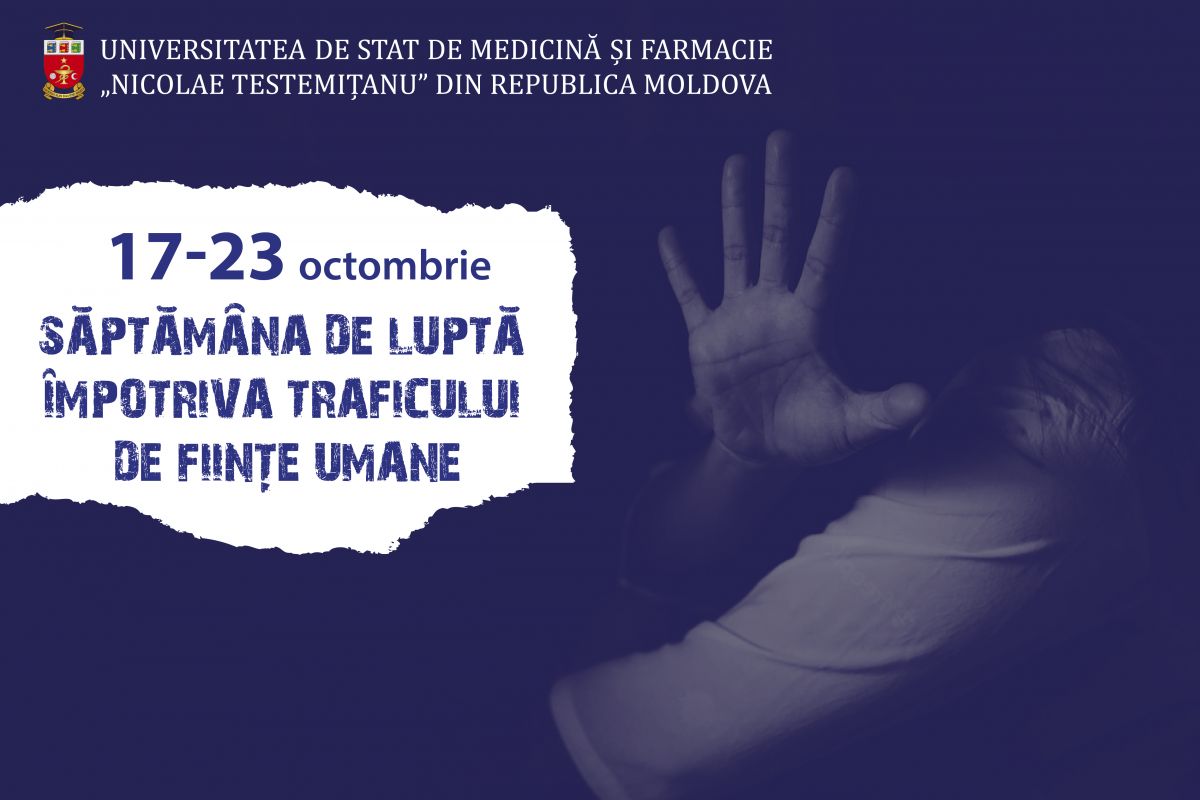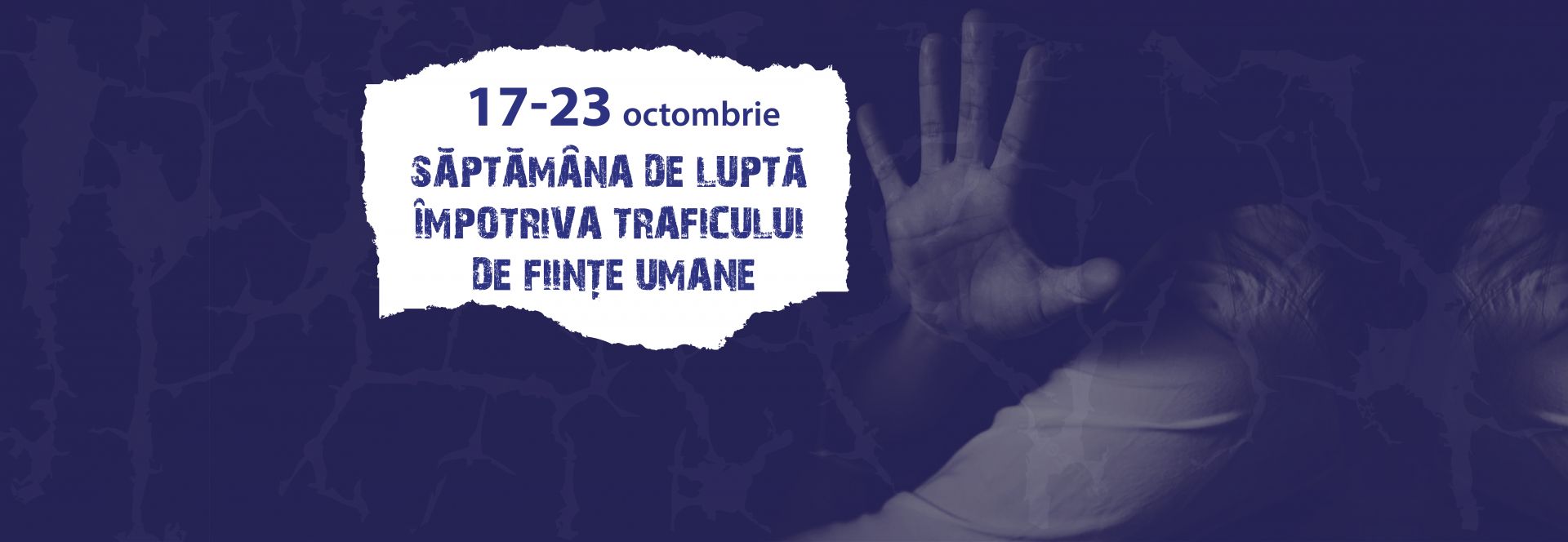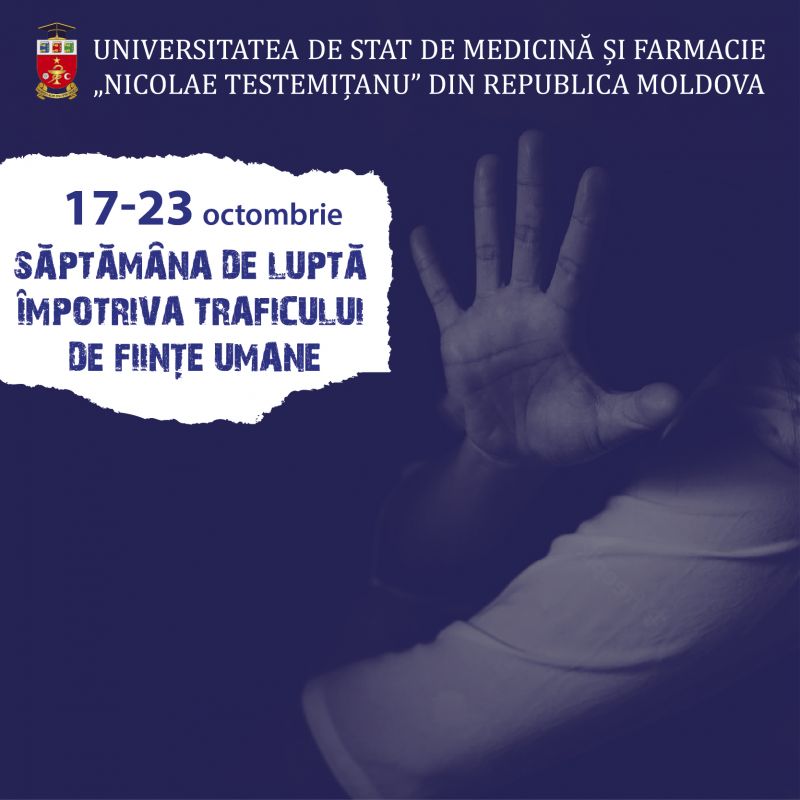Say no to human trafficking!
- 3599 vues
 In the context of the European Anti-Trafficking Day and Week, marked between October 17-23, 2022, Nicolae Testemitanu State University of Medicine and Pharmacy of the Republic of Moldova warns about the risks and consequences of this phenomenon. The Anti-Trafficking Week national campaign has reached its ninth edition and represents an important information tool for the purpose of raising awareness of the risks and preventing cases of human trafficking.
In the context of the European Anti-Trafficking Day and Week, marked between October 17-23, 2022, Nicolae Testemitanu State University of Medicine and Pharmacy of the Republic of Moldova warns about the risks and consequences of this phenomenon. The Anti-Trafficking Week national campaign has reached its ninth edition and represents an important information tool for the purpose of raising awareness of the risks and preventing cases of human trafficking.
Trafficking in human beings is a complex phenomenon, approached in the context of transnational organized crime, but also a serious violation of human rights, which affects all states, including the Republic of Moldova. In addition, the crises of the past eight months have increased the vulnerability of people who may become victims of trafficking for the purposes of sexual services and labor exploitation. Citizens of Ukraine and Afghanistan are at risk of being trafficked due to the tense situation in their countries. Likewise, the vulnerability of children to being trafficked cannot be ignored, as it is necessary to prevent and protect victims and potential victims at a young age.
According to official data, annually in the world between 600-820 thousand people are trafficked abroad, plus those trafficked within countries - an indicator that can reach millions. About 70% of the number of trafficked persons are women and girls, most of whom are forced to practice prostitution, 50% of the number of victims are minors who are sexually exploited, forced to work or have their organs taken.
How can human trafficking occur?
In many cases, victims of human trafficking are lured with lucrative jobs abroad. Later, once they arrive at their destination, often at the expense of the traffickers, they discover that they are in debt and forced to work for free or for a derisory salary. Women and girls are often recruited to work in the service sector or the hotel industry, but are actually forced into prostitution, an accepted situation due to debt, drug addiction or violence.
Direct signs of human trafficking:
- Recruitment – involves attracting the person in a traffic situation through offers of studies or jobs, by concluding fictitious marriages, etc.;
- Transportation – involves moving the person abroad, on foot or by means of transport, often using illegal routes (forests, crossing rivers by swimming, etc.);
- Transfer - represents the transmission of the victim to a third person through various methods: sale-purchase, exchange, lease, because of a debt, donation or through other types of transactions with or without redemption;
- Sheltering - involves placing the victim in a hidden place so as not to be discovered by the law enforcement officers or another third party, able to denounce the traffickers;
- Threat and application of physical or mental violence;
- Confiscation of documents – involves the theft of identity documents, passport, residence permit, etc. from the victim;
Keeping the person in a state of servitude for the purpose of paying a predetermined debt unjustifiably - involves the situation in which the victim is deprived of freedom, including movement, being held hostage until the time of payment, personally or through a third person, of a legal or illegal debt ;
Restricting free movement – depriving the victim of the right to move or limiting him only within the perimeter of a restricted area, often in order to avoid contact with other people or to obtain maximum work efficiency;
Threat of being handed over to the authorities - usually applies to illegal migrants.
To avoid the risk of becoming a victim of human trafficking, when you are offered a job abroad:
- Find out the name and as many details as possible about the person who helps you to get the job;
- Find out the name, address and data of the company with which you are going to sign the employment contract;
- Pass on the given information to people you trust – parents, relatives, friends;
- At the stage of issuance of documents necessary for the trip, do not entrust the passport to anyone, for any reason;
- Iinform people you trust about your travel itinerary, accommodation and contact details.
Situations that should put you on guard:
- If the employer finances the completion of documents and tickets - there is a risk of "forming a debt towards these persons";
- If the offer comes from a natural person or from a company not registered in the Republic of Moldova;
- If the job is offered by a company whose data cannot be found on the Internet;
- If the person avoids clear answers to questions about the address, contact details and full name of the owners and managers of the company in which you are going to work;
- Report to the police the cases that seem to fit into the patterns of the crime of human trafficking.
If you have been involved in one of the situations described above, or you know people who can be identified as victims of human trafficking, ask for help from the nearest embassy or consular office of the Republic of Moldova in the country where you are, including the emergency phone numbers published on their web pages. According to the law, victims or potential victims of human trafficking have the right to the following services:
- Informational counseling regarding their rights and the services they can benefit from;
- Psychological counseling;
- Legal assistance guaranteed by the state;
- Financial compensation from the state for the damage caused by the crime;
- Assistance in completing and issuing identity documents.
Don't believe in false dreams. Human beings are priceless!
Preluarea informației de pe site-ul USMF „Nicolae Testemițanu” poate fi efectuată doar cu indicarea obligatorie a sursei și a linkului direct accesat pe www.usmf.md.



Comentarii